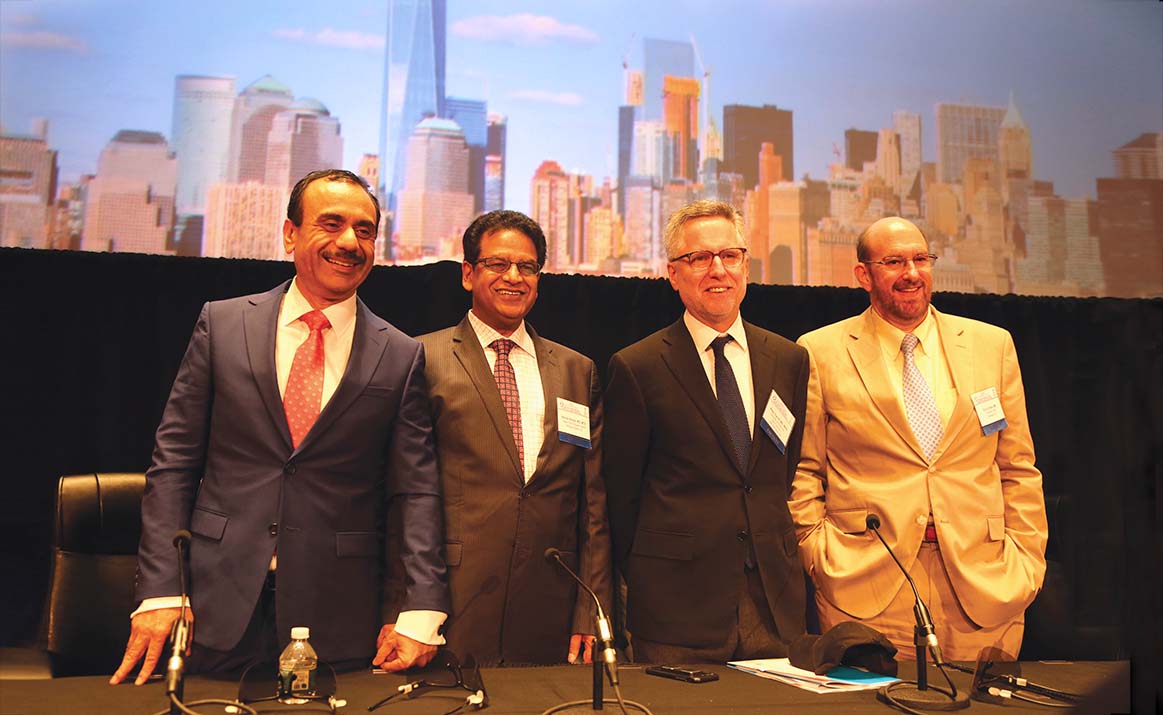
From left: Ash Tewari, MBBS, MCh, with three of the speakers, Ashok Hemal, MD, Wake Forest Baptist Health; Peter Carroll, MD, MPH, University of California, San Francisco; and Eric Klein, MD, Cleveland Clinic.
More than 500 doctors, nurses, and other medical professionals recently attended the 2nd International Prostate Cancer Symposium and Inaugural World Congress of Urologic Oncology at The Mount Sinai Hospital. The three-day event in September was hosted by the Milton and Carroll Petrie Department of Urology at the Icahn School of Medicine at Mount Sinai and held in collaboration with the Society of Urologic Robotic Surgeons and the Endourological Society.
Participants included more than 80 of the world’s leading experts in prostate, kidney, and bladder cancers. There were more than 100 presentations on improving patient outcomes, the genomic complexity of prostate and kidney cancers, novel biomarkers, and updates on the latest treatment techniques, including focal therapy and fusion biopsy. The symposium also recognized the 75th Anniversary of the Department of Urology at the Icahn School of Medicine at Mount Sinai.
“We were gratified by the number of leaders in our field who chose to attend,” says Ash Tewari, MBBS, MCh, the Kyung Hyun Kim, MD, Chair in Urology, Mount Sinai Health System, and the Director of the symposium. “We believe this symposium underscored the value of collaborating with colleagues from different countries and specialties in order to improve care for patients. We have already started planning for next year’s symposium.”
Among this year’s highlights were live robotic prostate and kidney surgeries performed in 3-D and in real time by Dr. Tewari and symposium co-director Ketan Badani, MD, Vice Chair of Urology, Director of Robotic Surgery, and Director of the Comprehensive Kidney Cancer Program, Mount Sinai Health System. Mount Sinai’s Department of Urology runs one of the busiest robotic surgical programs in the United States for prostate, kidney, and bladder cancers.
“These live surgery and video presentations are invaluable teaching opportunities,” says Dr. Badani. “Wearing the special glasses and with the cinematic projection, attendees can experience the same high-resolution, three-dimensional view that we have while performing robotic surgery.”
Says Dennis S. Charney, MD, Anne and Joel Ehrenkranz Dean, Icahn School of Medicine at Mount Sinai, and President for Academic Affairs, Mount Sinai Health System: “The depth and breadth of programs—from live 3-D surgeries to point-counterpoint debates conducted by leaders in the field of urology—reflect impressive planning and organization on the part of Dr. Tewari and his team. Events such as these help advance the reputation of the Icahn School of Medicine at Mount Sinai.”
Leaders from The Tisch Cancer Institute at the Icahn School of Medicine at Mount Sinai and the Lillian and Henry M. Stratton-Hans Popper Department of Pathology and Laboratory Medicine at the Mount Sinai Health System served as associate directors of the symposium. They included: Nina Bhardwaj, MD, PhD, Professor of Medicine (Hematology and Medical Oncology); Carlos Cordon-Cardo, MD, PhD, the Irene Heinz Given and John LaPorte Given Professor and Chair of the Department of Pathology at the Mount Sinai Health System; and William Oh, MD, Chief of the Division of Hematology and Medical Oncology, Professor of Medicine, and Urology, the Ezra M. Greenspan, MD Professor in Clinical Cancer Therapeutics, and Associate Director for Clinical Research, The Tisch Cancer Institute.
“This comprehensive event made me realize how much is already known and how much more needs to be done to advance patient care,” says Ramon E. Parsons, MD, PhD, Director of The Tisch Cancer Institute, and the Ward-Coleman Chair in Cancer Research and Professor of Oncological Sciences.
